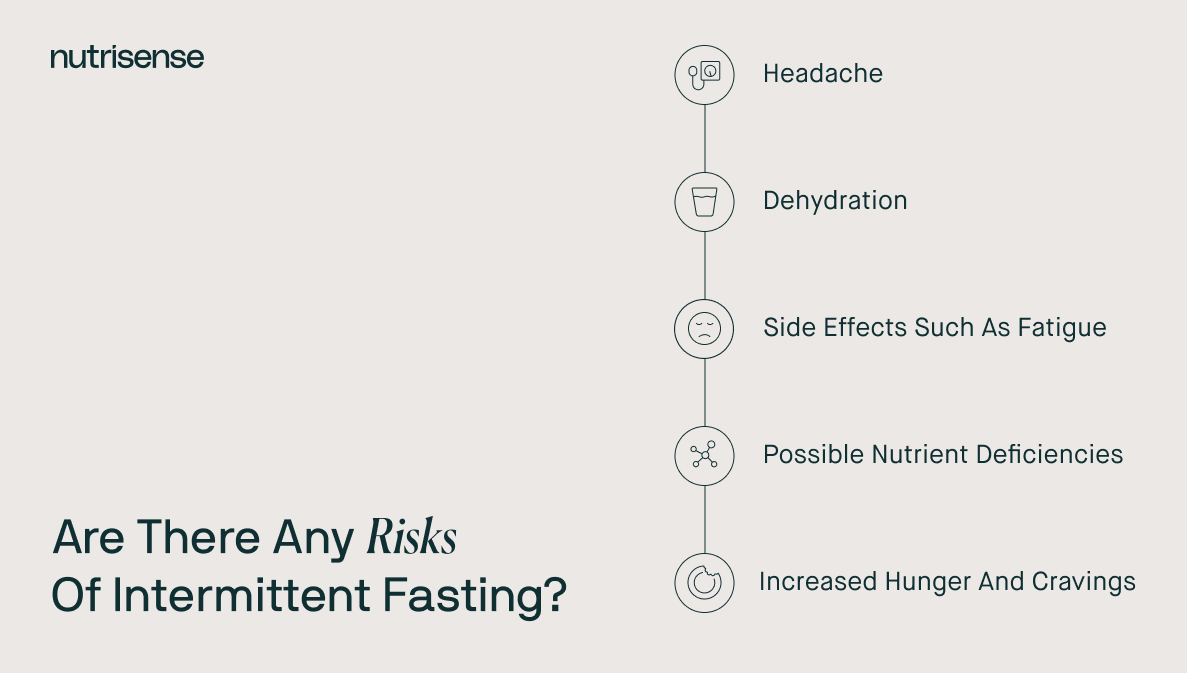Intermittent Fasting and Weight Loss: Are They Connected?

Key Takeaways
The term intermittent fasting (IF) has attracted a great deal of attention in recent years. If you’ve spotted it lingering in the news, you’ve probably seen proponents of this approach suggest it can promote everything from weight loss to longevity or even reverse insulin resistance.
Is there any truth behind these claims? And if so, what is the ideal fasting period to follow?
Let’s discuss the potential health benefits of intermittent fasting and how some believe it may be used as a weight loss strategy.
What is Intermittent Fasting?

Intermittent fasting involves shifting between periods of eating and periods of fasting. You might imagine that you already practice some form of intermittent fasting while sleeping. And you’re probably right!
Many of us may naturally fast for around 12 hours due to normal sleep cycles. Throughout human history, people have also fasted due to natural food shortages or even for religious reasons.
So how does intermittent fasting work? Interestingly, fasting diets don't focus so much on what you’re eating as they do on when you’re eating.
There are a few popularized or modern trends in fasting that can be broken down into categories such as:
- Daily time-restricted eating
- Alternate-day fasting
- Extended or multiple-day fasting
Daily Time-Restricted Feeding

This is a type of time-restricted eating that tends to focus on daily repetitive patterns of eating/fasting, such as:
- 14:10 (fasting for 14 hours with a ten-hour eating window)
- 16:8 (fasting for 16 hours with an eight-hour eating window)
- 18:6 (fasting for 18 hours with a six-hour eating window)
- 20:4 (fasting for 20 hours with a four-hour eating window, also called One Meal A Day or OMAD)
Alternate-Day Fasting
Alternate-day fasting (ADF) often involves alternating between days of no food restriction with days that consist of one meal that provides around 25 percent of daily calorie needs. Some people might also choose to forego that one meal for a “clean” fast on their fasting day.
Extended Fasting or Multiple-Day Fasting
This may involve fasting for two to seven consecutive days. There are also things like fasting-mimicking diets (FMDs), which may not fit neatly into any of the above categories.
Many FMDs attempt to capture some of the supposed benefits of fasting by reducing calories and certain macronutrients or adopting a cyclic approach to these restrictions.
But what, if any, impact do the different types of intermittent fasting have on weight loss?
Is Intermittent Fasting Connected to Weight Loss?

When you fast, your body experiences a series of predictable changes in hormones and other cellular processes that allow you to adapt to the lack of incoming fuel. This helps to keep your blood sugar stable and power your body’s life-sustaining functions, even when you’re not eating.
Some believe that by fasting for longer periods of time, you can encourage your body to shift into a fat-burning state. But while studies have suggested that certain types of intermittent fasting may result in weight loss, current research does not consistently show that intermittent fasting is superior to continuous low calorie diets for weight loss success.
Here’s what a few studies have found when looking at intermittent fasting and weight loss:
- A randomized controlled trial that tracked 100 obese adults for one year did not find intermittent fasting (with alternate day fasting) to be more effective than daily calorie restriction.
- A one-year randomized trial also did not find intermittent fasting (16:8 method) more beneficial than calorie reduction without a restricted eating time.
- A systematic review of 12 clinical trials compared the fasting group with the continuous calorie restriction group. They concluded there was no significant difference in weight loss amounts or body composition changes in the groups.
Is it Safe for Weight Loss?

If you’re looking to lose weight and trying to decide if intermittent fasting is right for you, there are many things to consider. How will it impact your hormones, stress, and overall health, and what side effects could this diet have?
New research from a 2022 study found that there was a tendency for intermittent fasting to decrease androgen or testosterone levels in both men and women. While this might be desirable for women who struggle with PCOS, it might be less desirable for men looking to boost testosterone levels.
There might be some additional concerns when opting for certain types of intermittent fasting. For example, a study that looked at time-restricted eating found that about 65 percent of the weight lost in the TRE group was from muscle, not fat.
Losing lean muscle mass can harm metabolic health in a number of ways, including making it harder to keep weight off over time and a higher likelihood of regaining weight lost. Most of the studies that have been done are relatively short-term studies, so more research may still be needed on this subject.
Weight Loss and Lean Muscle Mass

Protein is incredibly important for supporting healthy weight loss. And as your body ages, your risk for age-related muscle loss, or sarcopenia, increases.
That’s why having adequate protein to support muscle growth and maintenance is crucial. Some studies show that muscle protein synthesis (MPS) is impacted by how often you are consuming protein and in what amounts.
Some research suggests that optimal protein absorption may occur when you eat around 0.4g/kg of protein per meal. This means that if you weigh 140 pounds, eating around 25-30 grams of protein per meal may be a good target for supporting MPS.
The recommended daily protein intake for most non-sedentary people may be around 1.0-2.0g/kg/day. If you’re an active person, your protein needs may increase and fall more within a range of 1.4-2.0g/kg/day or even slightly more.
So, if you weigh 140 pounds, this might mean your daily protein targets fall between 90-130g/day. You can begin to see how it might start to become harder to meet your protein needs for optimal MPS with regular longer fasting windows and fewer meals during your day.
If you’re not sure whether or not you’re meeting your protein needs, consider working with a trained nutrition professional, such as a dietitian or licensed nutritionist.
How Are Insulin Levels Affected By Intermittent Fasting?

If you are someone who has a diagnosis of insulin resistance, including prediabetes or diabetes, it’s always important to talk with your doctor about the right approach for you.
Even though most studies have not shown that intermittent fasting is superior to regular caloric restriction for weight loss, there is some evidence that it might support improved insulin sensitivity in some people.
However, researchers are still questioning whether this effect is entirely independent of the weight loss effect itself. Here’s what some studies have shown so far:
- In a systematic review and meta-analysis of people with and without prediabetes, the intermittent fasting group had significant reductions in fasting glucose levels compared to the control group.
- In another controlled study of men with or without type 2 diabetes who practiced alternate-day fasting, they found that glucose homeostasis, insulin secretion and sensitivity did not change without weight loss.
Are There Benefits to Intermittent Fasting?

Even though many fasting approaches may not necessarily improve your chances of losing weight when compared to a regular restricted-calorie approach, some scientists believe you can use specific meal-timing strategies to boost your weight loss success.
Increased Insulin Sensitivity
One study compared an alternate day fasting regimen to a calorie restricted diet and a control group of obese, non-diabetic patients. Over one year, there were similar reductions in body weight and fat mass between the two groups.
However, there were also significant reductions in fasting insulin levels in the alternate day fasting group.
Supports our Natural Circadian Rhythms
Your body’s circadian rhythm appears to be one of the key factors affecting the results of time-restricted eating. Some researchers in the field of chrononutrition believe that how you plan the timing of your fasting or eating window may play more of a role than the fasting itself.
Eating patterns that favor a moderate time-restricted shift to an overall earlier eating window may provide some benefit for weight and metabolic health compared to eating patterns that follow a later eating window.
One study even suggests it is not the duration of the eating window, but the timing of the meals that may matter most when it comes to diabetes risk. They found that eating your morning meal before 8:30 a.m. may reduce your risk for developing type 2 diabetes and improve insulin sensitivity.
Improve Appetite Regulation
Other studies have shown morning loaded intake (or eating a big breakfast) may improve appetite regulation through the day. Results from another study also suggest that an early eating window may be associated with greater weight loss.
To find the right length of eating/fasting window and appropriate caloric intake for your individual needs, it may be best to work one-on-one with a dietitian who can support you.
Potential Risks of Intermittent Fasting

As you now know, intermittent fasting can take many different forms. The effects of intermittent fasting on your health may depend on what type of IF you practice as well as your sex, age, genetic and family history, and even your current or past medical conditions.
It’s always best to consult with your medical care team before deciding to begin a fasting protocol.
Possible Nutrient Deficiencies
If you do try some form of intermittent fasting, it’s important to remember that a longer or more aggressive fasting window is not a solution for a poor quality diet. Worsened health and weight outcomes may be associated with dietary patterns that include:
- Higher intake of added sugar
- Ultra-processed foods
- Low nutrient-density
Longer fasting windows with lower intake of nutrients overall may also increase your risk for nutrient imbalances, especially if you’re not eating a balanced and healthy diet.
Increased Hunger and Cravings

Though certain types of intermittent fasting may promote weight loss, other studies have shown that prolonged periods of food deprivation may increase cravings and make overeating more likely when food is reintroduced.
This may make certain types of fasting protocols harder to sustain for some people or harder to see longer-term benefit from.
Disordered Eating
Additionally, if you have a history of disordered eating or tendencies toward disordered eating behaviors, intermittent fasting is not recommended. In one study examining the link between binge-eating behaviors and intermittent fasting, researchers found that the participants who had previously done intermittent fasting were most likely to have an episode of binge eating compared to those who had never fasted.
Another study reported that there was a strong connection between those practicing intermittent fasting and symptoms of disordered eating.
Can Anyone Do Intermittent Fasting?
According to experts, in addition to those with an eating disorder, individuals with the following conditions should consider abstaining from intermittent fasting:
- Use of medications that require food intake
- Active growth stage, such as in adolescents
- Frail, older adults
- Pregnancy, breastfeeding
- Immunodeficiency
- Chronic fatigue syndrome or other related conditions
There are still many questions that remain unanswered in the science of intermittent fasting. More high quality controlled studies looking at longer-term outcomes are needed before we can understand the full impact of these approaches on health.
In the meantime, it’s never a wasted effort to invest in improving the quality of your diet and supporting your healthy habits.
Find the right Nutrisense programto turn insight into progress.
Go Beyond Glucose Data with Nutrisense
Your glucose can significantly impact how your body feels and functions. That’s why stable levels are an important factor in supporting overall wellbeing. But viewing glucose isn't enough. Nutrisense, you’ll be able to learn how to use your body's data to make informed lifestyle choices that support healthy living.
One-to-one coaching
Sign up to access insurance-covered video calls to work with a glucose expert: a personal registered dietitian or certified nutritionist who will help tailor your lifestyle and diet to your goals.
Monitor and measure what matters
With the Nutrisense CGM Program, you can monitor your glucose with health tech like glucose biosensors and continuous glucose monitor (CGM)s, and analyze the trends over time with the Nutrisense App. This will help you make the most informed choices about the foods you consume and their impact on your health.
Find your best fit
Ready to take the first step? Start with our quiz to find the right Nutrisense program to help you take control.

Jordyn has a bachelor’s degree in biology, a graduate degree in Human Nutrition and completed a dietetic internship at the Memphis VA. She's a dietitian at Nutrisense, and has experience working as a clinical dietitian at a VA medical center specializing in oncology and at the Mayo Clinic, working with a wide range of patients ranging from neonates in the NICU to adult ICU.




